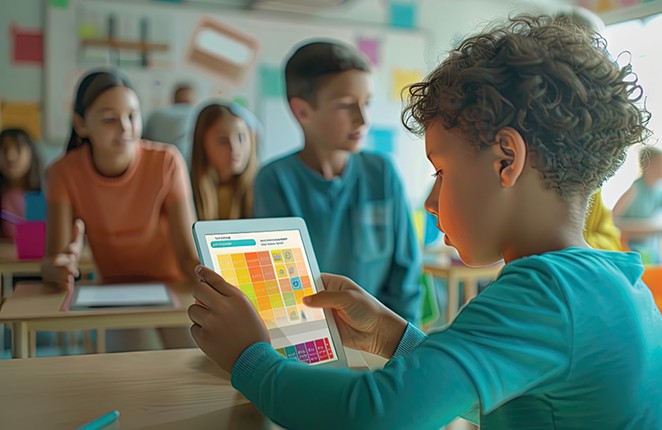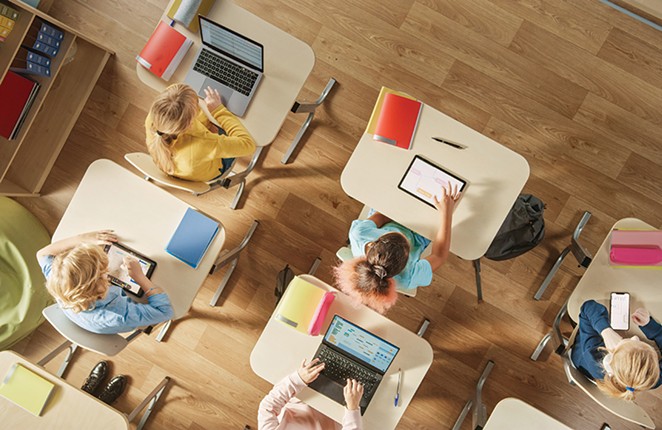It was the last day of school for most students at Bend La-Pine Schools. While many throughout the district celebrated the summer ahead on June 18, a group of concerned parents and healthcare practitioners gathered at the evening's school board meeting to challenge administrators to urgently reconsider technology use in schools.
"I brought in show and tell from my son, a first grader," said Megan Bowerman, a BLPS parent and English teacher at Bend Senior High School, holding up a drawing of three stick figures seated at desks in a classroom. In each stick-kid's hands is a tablet. The teacher stands at the front of the classroom and to her right is a window with a view of an empty playground. "This is from his, 'What I like About School, First Grade Reflection,'" she said, adding that when asked to list his favorite things about school, her son wrote iPads, Lexia, DreamBox and Epic, with friends and recess at the bottom.
"I know Bend-La Pine is doing way more than this, I know," Bowerman said. "But I just couldn't help but wonder what would be on my kid's picture, and what would be on his top line, if iPads weren't a daily part of his agenda."
The question of what classrooms would be like without iPads and cell phones is one many are pondering, from parents to teachers to elected officials. It's a question being explored at the global and local level.
In 2018, France banned phones from elementary and middle schools. A few years ago, hundreds of middle schools in Norway banned cell phones and found significant improvement in grades and mental health – especially for girls – along with a steep drop in reported bullying. Last month, one of the largest school districts in the nation, Los Angeles Unified, voted to ban cell phones and social media for all grade levels during school. Meanwhile, studies are increasingly finding that the embrace of iPads and tablets in schools should be seriously reconsidered, particularly for the youngest students.
Bend-La Pine Schools, which adopted iPads for third graders and up in 2013, is now facing criticism from a growing contingent of parents and local healthcare professionals asking the district to reconsider iPad and phone usage in schools. At the state level, Rep. Emerson Levy (D-OR53), whose daughter attends a school in the BLPS district, is spearheading a push to develop legislation requiring every school district meet minimum standards for cell phone use policies.
Pushing back against media
The movement to reconsider technology use in BLPS kicked off last year with a conversation between two friends on a playground. Brooke Mues and Ami Formica, while watching their young daughters play together, started sharing their concerns about the challenges they saw ahead as the girls approached middle school.
Initially concerned about social media, they launched talks to rally other parents to rethink this type of use. What they quickly learned from those sessions, and from a survey they later sent out district-wide, was that while social media is a concern, most families wanted help advocating schools for stronger tech policies, Formica said. In response, the duo formed Well Wired, an advocacy group promoting "healthy tech" in schools.
At the June 18 school board meeting, the group presented a letter of concern signed by 135 local pediatricians, family medicine doctors, child psychologists, therapists, counselors and mental and behavioral health providers.
"Kids are spending too much time on devices at home and at school, and too little time socializing with friends in person, playing outdoors and having face-to-face experiences that will help them develop into thriving, healthy adults," the letter read. "Children are also accessing troubling content on their devices, seeing images of pornography and self-harm, which significantly impacts their healthy development."
The five points enumerated in the letter for how the district could improve tech use in schools: remove iPads for the youngest grades (kindergarteners through second graders didn't have personal iPads until the pandemic and remote learning hit), set age-appropriate screen time limits, remove YouTube and "gamified programs" from iPads, prioritize pencil-to-paper learning and use iPads only when it "clearly improves the depth of learning" or introduces a skill like coding.
Dr. Sean Roberts, whose signature appears on the letter, is a Bend-based mental health counselor and assistant professor of psychology and addiction at Central Oregon Community College and the father of a kindergartner in the district. He says among his top concerns are the impact of tech use on developing brains and the soaring rates of anxiety and depression among adolescents.
"We look at the dramatic changes in the environment over the last 20 years and one can understand why we need some guardrails here," Roberts said. "Because the human species is now forming, the brain is finishing developing around this world, where they're deeply embedded within technology that requires almost no capacity to develop delayed gratification, it inhibits mental imagery and reduces face-to-face interaction."
The adaptability of a young brain is something Roberts said needs to be more closely guarded. "And so, when we understand that about the brain, one can understand why it's so critical that we do more to protect the young children's brain, he added. "Because kids are not little adults, their brain is different, and it is forming around an environment that is less than ideal."
Over the last decade, mental health struggles, especially for young girls, have skyrocketed. Roberts likens the graph to a hockey stick – where for years national data showed relatively stable mental health and happiness levels that around 2011, 2012 shot up. Last year, Oregon ranked 50 out of 50 in a recent study from Mental Health America that looked at the prevalence of mental illness among youth and the rate of access to care. In Deschutes County, the struggle with mental illness among youth is especially striking. According to the 2023 Deschutes County Suicide Data and Trend Report which used data from 2000 to 2020, 58% of all Deschutes County deaths among 10 to 17-year-olds were suicides, compared to 29% in the state and 19% nationally.
"Literally, kids are dying," Roberts said, adding that he doesn't think it makes sense to wait and see if experts can prove causation between social media and heavy tech use, higher rates of suicidality, depression and anxiety. "We know it's interfering with things we know are critical to development," he said, adding that screen time replaces key activities like exploring outside, playing with friends and even just being bored – a state that can help kids develop creativity and resilience.
In May, U.S. Surgeon General Dr. Vivek Murthy issued an advisory on social media and youth mental health that echoes Roberts' concerns. "We are in the middle of a national youth mental health crisis, and I am concerned that social media is an important driver of that crisis – one that we must urgently address," Murthy said. Last October, Oregon joined 33 other states in a lawsuit against Meta (owner of Facebook and Instagram) alleging that the company "designed and deployed harmful features on Instagram and its other social media platforms that purposefully addict children and teens."
Levy said that part of the impetus for designing a statewide policy to direct school districts to develop criteria around cell phones was because of new findings about youth mental health and the state's involvement with the Meta suit.
"We have a responsibility to our kids; we are adults in the room, and we need to act like it," she said. "And for me, it just lit a fire under me when I saw these stats that it was affecting our students' mental health in a way that I did not appreciate."
Next steps
During the school board meeting last month, Scott McDonald, director of IT at BLPS, said he welcomes input about the district's tech policies and that they are considering potential changes for next school year. McDonald said they would look at limiting device use for students in kindergarten through second grade, removing access to YouTube content on student devices at the elementary and middle school levels and providing a device management resource to teachers that would limit student access to specified apps for the length of a class period.
Currently, the district has an "off and away" policy for cell phones, but enforcement varies by school and class. This too may be sharpened. And, McDonald stressed, there is structure around the iPad usage policies and a willingness to revisit policies when concerns are raised. But, he points out, iPads are a powerful tool and technology isn't going away, so removing them could create inequity among the students. For some families, the school-issued iPad is the primary way students access the internet at home and allows them to explore learning materials outside of the classroom. For educators, it can help them track student involvement more closely and intervene earlier if needed, as well as create personalized plans for students to complete lessons at their own pace.
"There's also a relevance consideration," McDonald said. "There are certain things we have to be doing with technology just because of the ubiquitous use that it has in nearly all industries."
McDonald said he appreciates that Well Wired has ignited a conversation. He said he looks forward to forming a task force to look at the district's policy around iPads in schools.
Formica, co-founder of Well Wired, said she is continuing talks with BLPS leaders about the issue and would like to see the district go further in its study of iPad usage.
"How do you teach kids healthy limits around the devices?" she said. "Because part of what we know about technology is that we actually need to have limits. We need to learn how to turn things off, or put them away or shift our focus away from the screen into the real world."
This article was originally published in the Source Weekly newspaper.








![Race for Deschutes County Sheriff Heats Up ▶ [With Video]](https://media2.bendsource.com/bend/imager/race-for-deschutes-county-sheriff-heats-up/u/r-bigsquare/21832439/news2-1-ab920340a63d5120.jpg?cb=1726161706)












